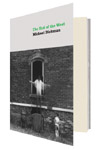Elizabeth Bishop said that the three qualities she admired most in poetry were accuracy, spontaneity, and mystery. Michael Dickman’s first full-length collection of poems demonstrates each brilliantly. The book opens with a quiet explosion: “Make a list / of everything that’s / ever been // on fire— // Abandoned cars / Trees / The sea // Your mother burned down to the skeleton // so she could come back, born back from her bed, and walk around the / house again, exhausted / in slippers.”
Dickman can shock, but he does so without ever breaking from his calm, unassuming tone. These are lithe, seemingly effortless poems, poems whose strange affective power remains even after several readings. Again and again the language seems to disappear, leaving the reader with woven flashes of image, situation, emotion: “My grandmother set sail on a small air mattress into the middle of / the pool and fell asleep // Her fingers / dragging the water // The men talk quietly inside // The outdated / California architecture / dissolves // into pale greens, pinks / and stark / lemon.”
Visually, the eighteen poems in this collection are jagged and airy: very short lines are occasionally interrupted by a very long line, and stanzas tend to be short, often only one or two lines in length. The poems’ structural asymmetry, however, is moderated by a tremendous sense of balance. Dickman’s unusually nuanced feeling for measure most strongly recalls the poetry of William Carlos Williams, George Oppen, and, more recently, Rae Armantrout.
Much of the force of this collection is generated by tensions embodied in a series of paradoxes: the speaker’s voice is personalized, yet anonymous; the tone throughout is calm, yet an electric current is palpable just beneath the surface; the material has a weightiness (death’s presence is felt everywhere), yet the poems seem to hover above the ground, snagged somewhere between heaven and earth: “Coconut cream pies rotated slowly behind bright windows like the / cities of heaven // The register sang / Flies collected / on our water glasses // My father, for a moment, was full of light // Men came and went // I knew // our waiter was the son / of someone.”
Another of the controlling tensions is between accuracy and mystery. Dickman continually unites the accurate (in terms of perception, thought, emotion) with the mysterious, and he does so in a way that feels natural, almost inevitable—or, to use Bishop’s word, spontaneous. The best example of this may be the stunningly beautiful poem “Seeing Whales,” which intercuts a whale-watching scene (“You can go blind, waiting”) with a scene of the speaker as a child watching his friend (both twelve years old) shoot heroin. The final section begins by imagining the whales “asleep / on the bottom of the world / sucking the world in / and blowing it out / in wave- / lengths // Radiant ghosts // Leif laid his head back on a pillow and waited for all the blood inside him / to flush down / a hole // After seeing whales what do you see?” That Dickman is able to make these two scenes seem so naturally coupled says something about the extent of his gift. These are durable poems from one of the most accomplished and original poets to emerge in years.





